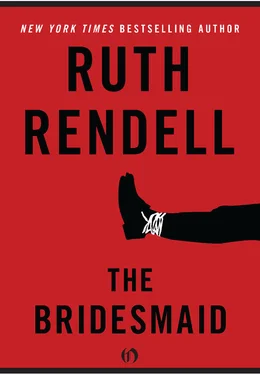Ruth Rendell - The Bridesmaid
Здесь есть возможность читать онлайн «Ruth Rendell - The Bridesmaid» весь текст электронной книги совершенно бесплатно (целиком полную версию без сокращений). В некоторых случаях можно слушать аудио, скачать через торрент в формате fb2 и присутствует краткое содержание. Год выпуска: 2010, Издательство: Open Road Integrated Media LLC, Жанр: Триллер, на английском языке. Описание произведения, (предисловие) а так же отзывы посетителей доступны на портале библиотеки ЛибКат.
- Название:The Bridesmaid
- Автор:
- Издательство:Open Road Integrated Media LLC
- Жанр:
- Год:2010
- ISBN:нет данных
- Рейтинг книги:3 / 5. Голосов: 1
-
Избранное:Добавить в избранное
- Отзывы:
-
Ваша оценка:
- 60
- 1
- 2
- 3
- 4
- 5
The Bridesmaid: краткое содержание, описание и аннотация
Предлагаем к чтению аннотацию, описание, краткое содержание или предисловие (зависит от того, что написал сам автор книги «The Bridesmaid»). Если вы не нашли необходимую информацию о книге — напишите в комментариях, мы постараемся отыскать её.
The Bridesmaid — читать онлайн бесплатно полную книгу (весь текст) целиком
Ниже представлен текст книги, разбитый по страницам. Система сохранения места последней прочитанной страницы, позволяет с удобством читать онлайн бесплатно книгу «The Bridesmaid», без необходимости каждый раз заново искать на чём Вы остановились. Поставьте закладку, и сможете в любой момент перейти на страницу, на которой закончили чтение.
Интервал:
Закладка:
But there had been nothing very spiritual that evening. Soon after that, they had got into her bed. When you were lying in her bed, you could see the legs of people walking along the pavement outside the window. That meant that if they bent down, they could see you. She laughed at him when he got up to close the shutters, but he closed them just the same. The lamp with its fringed shade gave a brownish dim light that laid a mysterious glaze on their lovemaking, a coat of gold to their moving limbs. She seemed to have an inexhaustible ardour, an inventiveness she pursued with a frown of concentration until she broke into high breathless laughter. She laughed a lot, he already loved her laughter. He already loved her extraordinary voice, high without shrillness, smooth and pure and cool.
He had meant to get up and go home at midnight—but used and repeatedly ridden by her, devoured and chewed and grasped and drawn in, expelled only with desperate reluctance, excavated with a child’s little strong fingers and excoriated with a tongue as coarse as a cat’s, he had whimpered and sighed and slept. The last thing he remembered hearing her say before that deep deathlike sleep came was, “I don’t just want to have you, Philip, I want to be you.”
Next morning, Sunday, he had walked in at ten—he hadn’t awakened till past nine—to find Christine and Cheryl on the point of calling the police. “I thought,” his mother said, “how awful it was going to be if I’d lost a son as well as a daughter.” She didn’t ask him where he had been, and that wasn’t tactfulness or discretion. Now she had him back, she simply didn’t think of where he might have been or what he was doing.
He walked into the living room and the postcard was gone. Because he had spoken about it to her or Fee had? On the rug in front of the fireplace lay a tiny, bruised pink rosebud. It must have come from one of the bridesmaids’ wreaths or bouquets, perhaps from Senta’s. It was a funny thing, though, that you couldn’t think of Senta in that sort of way, a sentimental or romantic way. You wouldn’t think of needing a flower that had been hers to remember her by. He picked it up and smelt it and it said nothing to him. But why should it? He had Senta and would have her again tonight; he had the real woman herself with her tarnished silver hair.
Cheryl came into the room and handed him a five-pound note. He felt differently from yesterday, fourteen or fifteen hours ago only, an entirely different person, and Cheryl’s troubles, if such existed, were remote from him, not his business.
“Thanks,” he said, and in such a preoccupied way as to make her stare at him. He would have liked best to tell her about Senta. Well, he would have liked best of all to tell Fee, if Fee hadn’t been on her way to St. Peter Port. Senta, in any case, had said no.
“I don’t want anyone knowing about us yet, Philip. Not yet. For a little while it must be our sacred secret.”
That had been two weeks ago. And since then he had seen her every day. By the first Tuesday he was telling Christine he would be staying away for the night, at least for tonight and maybe the next one, because Roseberry Lawn were involving him in a project of theirs at Winchester and were putting him up in a hotel. Now, for the first time, he understood the value of having a mother like Christine. That vagueness and unworldliness which had formerly irritated him—and worse, troubled him as to what this would mean for her future welfare—that apparent lack of knowledge of any sort of conventional response now appeared a godsend.
Senta had no phone. There was a phone half-hidden among the litter of junk mail on that table in the hall, but seldom anyone at home to answer it. Other people must live in the house, but Philip had never seen them, though one night, awakened by the phone, he had heard dance music above his head and the sound of waltzing feet.
Most nights, he went home to eat the meal Christine had prepared for him, took Hardy for a walk round the block, then drove to Kilburn. It was a relief one morning when Christine said she thought of spending the evening with her friend but she would leave him a meal and would that be all right? The friend was someone she had met at Fee’s wedding. What a lot of significant things had happened at Fee’s wedding!
Philip told her not to bother with a meal, he would eat out. He went to Senta’s straight from work, and for the first time they ate out together. It was a change; it was more like reality. Up till then he had been parking the car in the street at eight-thirty or nine, worrying a bit about it because this was a rough area. He would run down the basement stairs, his heartbeat racing. The smell was strongest here, in the well of the staircase. But inside Senta’s door it faded. There the damp sour smell of decay was overcome by the perfume of incense sticks, one of which was usually smoking in her room. She would be waiting for him, sitting in the window or cross-legged on the floor. Once she was reclining naked on the bed, reminding him of a picture someone had once sent Fee on a postcard, the Olympia of Manet.
To go out with her to a restaurant was a new experience. He discovered her to be not merely a vegetarian but a vegan. It was fortunate he had chosen to eat at an Indian place.
She wore a strange old dress that might have belonged to her grandmother, grey with silver threads woven into it, the belt missing, though you could see there should have been a belt, and a crumpled rose of grey silk on the bosom. Her silver hair hung like a veil bought to match it. She had painted her eyes green and her mouth dark purple. He didn’t know whether he liked this kind of dressing, but it disturbed him—it excited him—to look at her thus caparisoned. In the cheap Indian restaurant, where a tape played sitar music and the walls were papered with a design of elephants and turbanned men, where the lights were dim, she looked like a goddess of mystery and the arcane. Her mouth, though—he hated to see it concealed under that layer of greasy purple. Tentatively he had asked her to wipe it off, her mouth was so beautiful. Why had he expected defiance? She wiped her lips clean with a piece of tissue, then said to him in a humble tone, “I’ll do whatever you want. Whatever you like is right.”
“Tell me about yourself,” he said. “I don’t know anything about you, Senta, except that you’re an actress—sorry, actor—and you’re Darren’s cousin. Though I find that hard to believe.”
She smiled a little, then began laughing. She could be intensely serious, in a way he would have found embarrassing if he had tried to copy it, and she could laugh more freely and gaily than anyone he had ever known. He could understand she might not want to be too closely associated with the Collier family, a jolly beefy-faced crowd of sport-mad men and bingo-addicted women. “My mother was an Icelandic woman,” she said. “My father was in the navy, you see, and he met her when they put in at Reykjavik.”
“What do you mean ‘was,’ Senta? Your mother’s still alive, isn’t she?” She had told him her parents were separated, each now living with a new partner. “You said your mother had a boy friend you don’t much like.”
“My mother died when I was born.”
He stared at her, it seemed so strange. He had never heard of anyone dying in childbirth except in old books.
“It was in Reykjavik, I was born there. My father was away at sea.” Her expression had grown suspicious, slightly displeased. “Why do you look like that? What are you thinking? They were married, if that’s what you’re thinking.”
“Senta, I didn’t mean—”
“He brought me back here and soon after that he married Rita—she’s the woman I call my mother. My real mother’s name was Reidun, Reidun Knudsdatter. It means Canute’s daughter. Don’t you think that’s amazing? Not ‘son’ but ‘daughter.’ It’s an ancient matrilinear system.”
Читать дальшеИнтервал:
Закладка:
Похожие книги на «The Bridesmaid»
Представляем Вашему вниманию похожие книги на «The Bridesmaid» списком для выбора. Мы отобрали схожую по названию и смыслу литературу в надежде предоставить читателям больше вариантов отыскать новые, интересные, ещё непрочитанные произведения.
Обсуждение, отзывы о книге «The Bridesmaid» и просто собственные мнения читателей. Оставьте ваши комментарии, напишите, что Вы думаете о произведении, его смысле или главных героях. Укажите что конкретно понравилось, а что нет, и почему Вы так считаете.











